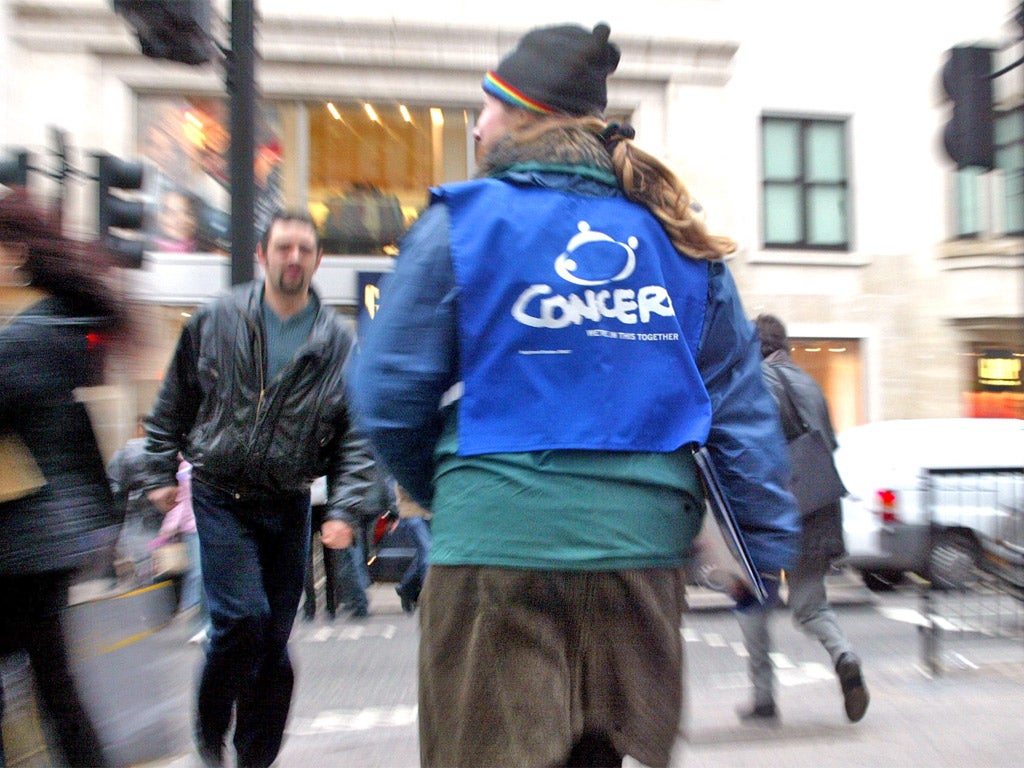Chuggers are bad for charity in the long run
Little is more vexing than being accosted by a pillock intent on talking about rainforests


I have a face that I reserve for clipboard-wielding strangers on the street who bound towards me like puppies. By staring expressionlessly into the middle distance and shaking my head, maintaining my stride, I hope to convey the message that I know they have a job to do but, should they attempt to talk to me, a plague of locusts will rain down on their heads and their houses will be reduced to a heap of ashes. It usually does the trick.
There’s not much love for charity muggers, or “chuggers”, the infuriatingly chirpy fundraisers who patrol city centres in the hope of extracting our debit-card details. For me, there is little more vexing than being accosted by a grinning pillock wanting to chew my ear off about rainforests just when I’m looking to blow a load of cash on some overpriced tat.
It’s not personal. I feel for these poor saps, many of whom are out-of-work actors or students trying to fund their way through university, forced to wear fluorescent tabards and block the paths of irritable passers-by, often in horizontal rain.
Look past their faux-ebullient expressions and you’ll see the disappointment in their faces that they’ve failed to land a more rewarding job, preferably one that doesn’t prompt strangers to threaten to punch them. When, recently, I declined a conversation with a young chugger, he called after me: “Don’t worry, I’m here all day.” It sounded less like an idle quip than a cry for help.
Councils have already started to clamp down on chuggers; so far 100 have signed agreements to limit fundraisers to specific days and shopping areas. Rules developed by the Public Fundraising Regulatory Association also states that Chuggers are not allowed to follow us for more than three steps, or loiter near shop doorways or cashpoints, or accost us when we’re drunk, though that doesn’t seemed to have curbed the irritation of shoppers who simply don’t want to encounter them at all.
Last week, Stephen Bell, head of Changing Lives – an organisation that provides support for vulnerable people – called for an outright ban on street fundraisers, owing to the hard-sell tactics that are causing people to “turn their backs on charities”.
He went on to note how the charitable sector’s reputation has taken a bashing in the past six months, from the collapse of Kids Company to the death of Olive Cooke, Britain’s longest-serving poppy-seller who was allegedly stressed by the amount of requests for charitable donations she was receiving, to the elderly man with dementia who lost £35,000 to scammers after charities sold his personal details. On top of this, Bell said, aggressive chugging “doesn’t do charities any favours at all”.
And this, really, is the heart of the matter. The scourge of chuggers isn’t only about the individuals impeding our passage through the high street, or doorstepping us in the middle of Strictly. It’s about how these charitable institutions, which are meant to signify all that is selfless and good in the world, conduct themselves.
Think of a charity worker and you might picture a kindly pensioner rattling a bucket of change, or a plucky youngster building waterpipes in sub-Saharan Africa. In fact, charities are businesses in a competitive market, which is why many hire fundraisers rather than use volunteers, and employ private companies for recruitment.
While there are clear financial rewards in doing so, the methods of some of these workers are ruthless, cold-calling the elderly and bullying them into parting with their bank details and making donations beyond their means. And if you are persuaded to set up a direct debit, a sizeable percentage of that will end up paying fundraisers and the company that hired them – and who wants that?
It’s also about the fraught and often guilt-ridden process we go through to decide who should have our money. Giving to charity is a personal act – often influenced by difficult episodes in our lives or those of our friends – and no one expects to be emotionally blackmailed on behalf of a charity they have chosen to overlook.
The pressure isn’t just from charitable organisations either. I’ve lost count of the friends and colleagues climbing Kilimanjaro or embarking on a similarly exotic odyssey, all the in name of a good cause. Now it’s nearly October, aka Stoptober, when scores of selfless people beg for donations in return for giving up a nicotine habit that, if continued, is likely to result in their death. Well done, guys.
The cumulative result is guilt, anxiety and, most damaging of all for those in need, compassion fatigue. Charities have their work cut out persuading us to open our wallets. Badgering people on the streets and bullying the vulnerable may ensure a level of financial return a more mild-mannered approach does not, but in the long run it’s counter-productive. Perhaps they should quit the hard sell, dial down the guilt and let us shop in peace.
Join our commenting forum
Join thought-provoking conversations, follow other Independent readers and see their replies
Comments
Bookmark popover
Removed from bookmarks